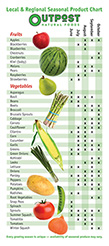GMOs
Food is what we’re all about. We like to think back to simpler times every now and then, when we could pick an apple from a tree branch or yank a tomato from a backyard plant and dig in, unburdened by.jpg) worries or questions about the food.
worries or questions about the food.
But we have to admit that food isn’t a simple issue these days, encumbered as it can be by questions of purity, humane farming practices, the influx of corporate interests, organic versus conventional horticulture, and even genetic integrity.
We’re committed to providing our owners and shoppers with as much credible information as we can, so that you can make informed choices when you walk the aisles of our stores. We don’t pretend to know what is best for each and every one of you – we whole-heartedly embrace and celebrate the diversity of the community to which we belong.
What are GMOs?
(click here for handy infographic about GMOs)
GMOs are genetically modified organisms, plants and animals that have undergone alterations to their original genetic material at the cellular level.
First experimented with in the mid-1970s, genetic engineering has rapidly grown in sophistication and frequency. Early experiments revolved around methods to make plants less susceptible to frost, but researchers soon moved onto transgenic engineering, in which genetic material from different species are combined into one organism.
Some genetic engineering is targeted at increasing the nutritional content of foods. So-called golden rice, for example, has been genetically altered to contain large amounts of beta carotene, in hopes of fighting Vitamin A deficiency among peoples who depend upon rice as a mainstay of their diets. More often, GMO crops are engineered to increase yields, foster faster growth or make plants that are more tolerant to the pesticides used in conventional farming.
And chances are, we eat them. Genetically modified foods first received approval for cultivation in the mid-1990s and today, the US is the largest producer of GMO crops in the world. GMO crops raised in the US include soybean, corn, canola, squash, papaya, alfalfa and sugarbeets, and the switch to those GMO versions has often been rapid. In 2011, close to 90% of the corn, soybean, canola and sugarbeet crops were GMO varieties.
But GMO foods have plenty of critics. Opponents worry about damage to the environment, the impact on local ecosystems from the growing of GMO plants, the loss of biodiversity, economic issues due to intellectual property laws and about potential health issues associated with the consumption of GMO foods.
Many opponents, citing the range of issues listed above, have called for mandatory labeling of foods containing GMOs, so consumers can make informed decisions about whether or not to purchase GMO foods. In the US, labeling isn’t required, so consumers often have no clear way to determine if the foods they’re purchasing contain GMOs. Outpost has long supported mandatory labeling of GMOs and is a sustaining member of the Truth in Labeling Coalition.
Outpost’s policy on GMOs
At Outpost, we believe that foods are best and when they are closest to their natural state, making organic one of the best options. Because we question the science behind the development of GMOs and their potential impact on food sources, we believe those products should be labeled. That’s why we actively support labeling laws – so that consumers can make informed choices about the foods they purchase and feed to their families. In our stores, we strive to provide information and to offer alternatives, so our shoppers can make the healthy choice that’s right for them.
Until the labels we seek are mandatory and until consumers can shop with complete confidence, this is what we pledge to do:
1. Whenever possible, provide shoppers with at least one certified organic product option in each food category where there is a possibility of GMO content. Because organic certification does not allow the use of genetically modified seeds in the production of organic crops, certified organic products are the least likely to contain genetically modified ingredients.
2. Continue to raise awareness and educate our owners, shoppers and the community about genetically engineered organisms through articles, lectures, workshops, and literature in our stores.
Unfortunately, in the absence of federally required labeling of products that contain genetically modified organisms, Outpost cannot guarantee that all products that we currently carry do not contain genetically engineered organisms.
What can shoppers do
1. Buy organic. It’s the best way to avoid GMOs in food. Organic growers and producers are forbidden to use products containing GMOs as feed for animals or to grow as food for production. Organic products are routinely tested for the presence of these organisms. That said, due to the proliferation of GMO crops and the potential for drift contamination, it would be difficult to ascertain that even organic foods were 100% GMNO-free without testing.
2. Ask your Congressperson to support mandatory labeling for GMOs here.
3. Download a free copy of the Non-GMO Project's Non-GMO Shopping Guide or download the app for your iPhone. Use these as guides, however, keep in mind companies listed must have at least one product verified by the Non-GMO Project. It doesn't mean that all products by that company are verified, nor does it include many certified organic producers or locally produced items.
For more than 40 years, Outpost Natural Foods Cooperative has been a leader in promoting organic and safer food choices. We intend to continue our efforts both locally, and nationally with the help of the NCGA, to raise awareness and request mandatory labeling so that consumers can make informed food choices.
Boycotts
As a co-op, we serve a diverse base of over 18,000 active owners and many more shoppers, all with differing opinions and needs. That diversity is something we celebrate – in fact, supporting diversity is part of our mission statement. Our policy is to inform customers about issues such as GMOs in the food supply so that they can make informed decisions. Those decisions will be reflected in sales in our stores. Simply put, if an item doesn’t sell, it likely won’t remain on our shelves. You can read about our boycott policy here.








 National Co+op Grocers (NCG) advocates for mandatory, federally enforced labeling of foods produced from genetically modified organisms (GMOs) as a consumer right-to-know issue.
National Co+op Grocers (NCG) advocates for mandatory, federally enforced labeling of foods produced from genetically modified organisms (GMOs) as a consumer right-to-know issue.
